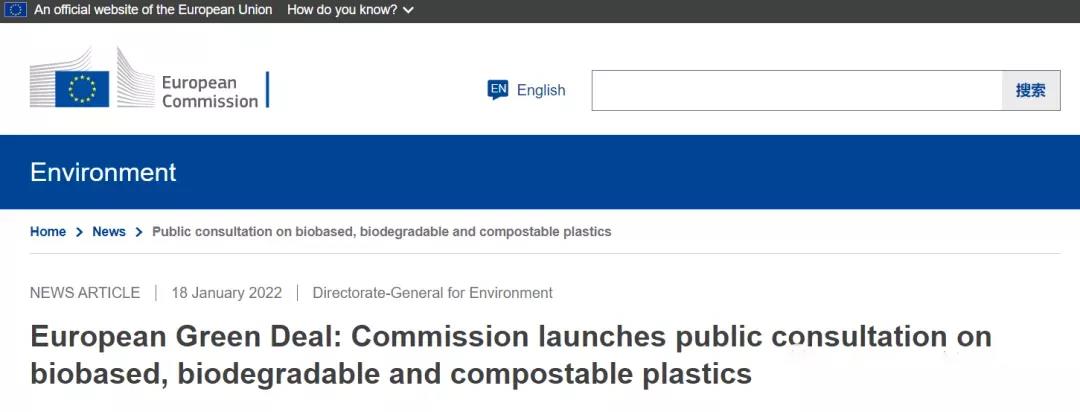On January 18, 2022, the European Commission launched a public consultation on a policy framework for bio-based, biodegradable and compostable plastics.
In the European Commission's question and answer on SUPD in May last year, when asked whether biodegradable plastics were banned, it was made clear that the SUP Directive, the guidelines, and the Q&A three documents did not have a clear signal of prohibition, and that the European Commission plans to develop a policy framework for the use of biodegradable or degradable plastics in 2022. The framework is based on the assessment that such plastics may be beneficial to the environment, as well as criteria for the application of such plastics.
On October 7, 2021, the European Commission announced that it will develop a clear policy framework to enable the application of bio-based, biodegradable and compostable plastics.
The consultation, which will provide feedback for the development of a new policy framework on these plastics, has been published on the website of the European Union's Directorate General for the Environment and is open for feedback for eight weeks, until March 1, 2022.
The policy framework for bio-based, biodegradable and compostable plastics is expected to be adopted in the summer of 2022.

Policy Objectives
Aims to promote bio-based, biodegradable and compostable plastics that deliver real environmental benefits. Contribute to a sustainable plastics economy.
Policy Background
Legal Level
There are no EU laws that apply comprehensively to bio-based, biodegradable and compostable plastics, and only two specific laws with partial targets.
The Single-Use Plastics Directive SUP
Plastic Bag Directive
Therefore, in the European Green Deal and Circular Economy Action Plan, the European Commission has published a policy framework on the procurement, labelling and use of bio-based plastics, and the use of biodegradable and compostable plastics.
Standard level
The EU standards committee CEN has published several standards for bio-based products, but there are no clear regulations for the portion of the product that is entirely or partially derived from biomass, and there are no EU sustainability standards applicable to bio-based plastics. The current EU harmonized standard for industrial compostable packaging is EN 13432, and there is still no common standard for marine biodegradation.
Issues facing the bio-based, biodegradable and compostable plastics industry
Biobased, biodegradable and compostable plastics are open to question in terms of.
1. Sustainability of biological raw materials used to produce bio-based plastics
Using bio-based feedstocks instead of those made from fossil fuels can help reduce the environmental impact of plastics throughout their life cycle. However, environmental impacts throughout the life cycle - including land use change, biodiversity and climate impacts, and littering - need to be considered. Currently, no EU sustainability standards apply to these plastics, and consumers want them to be fully sustainable.
2. Effective biodegradation of biodegradable and compostable plastics and their role in circular economy
These plastics can only prove to be environmentally beneficial if their biodegradability is verified by standards. While European standards exist for some environments (e.g. industrial composting), there are no European standards for biodegradable plastics for other conditions (e.g. marine environment).
3. Industry confusion
While these plastics have many similarities, they also have many differences. Consumers and users of these plastics currently do not have access to clear and reliable information when purchasing or disposing of these plastics, and labeling is only helpful when it is clear and complete. In addition, if these plastics are disposed of incorrectly, this can lead to cross-contamination of the waste stream, which can reduce the recyclability of the plastic.
Job Description
The European Commission will assess where the use of bio-based feedstocks provides real environmental benefits beyond the reduction of fossil resources, and will also assess where the use of biodegradable and compostable plastics is beneficial to the environment and the criteria for these uses.

